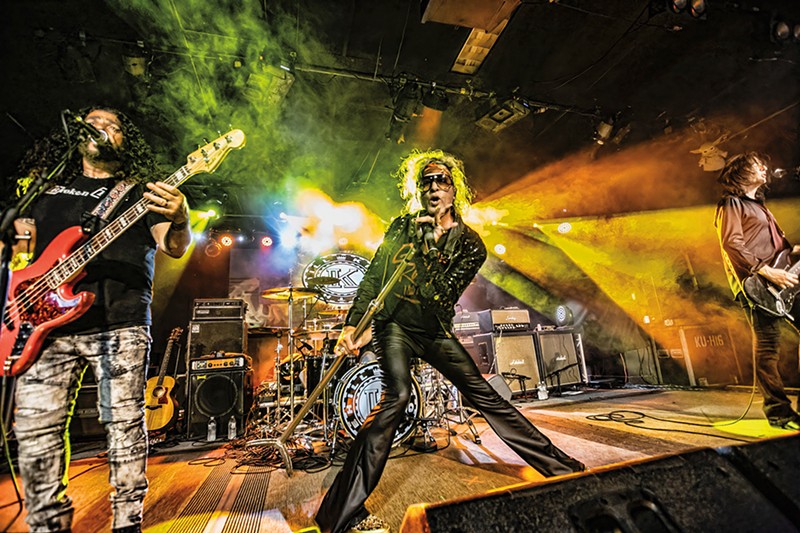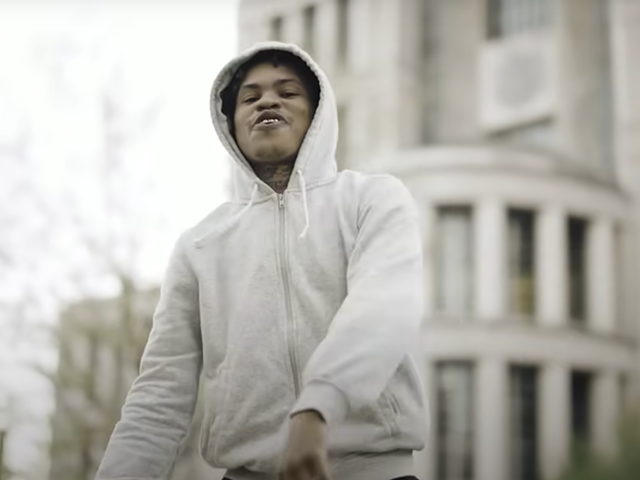If you tuned into MTV around 1990, chances are good that you were watching a glam-metal video. In those days, the lipstick-and-leather hair-metal bands — shimmering with spandex, Aqua Net, triple-innuendos, finger-tapping guitar solos, castrato vocals, cherry pies, girls writhing on the hoods of Jaguars, etc. — dominated the Dial MTV most-requested video countdown every day.
Amid a steady stream of Bon Jovi, Def Leppard and Guns N' Roses videos, you might have caught a clip from a young band out of St. Louis called King of the Hill — often stylized as an attention-demanding KINGOFTHEHILL — with an equally over-the-top video for their debut single "I Do U."
The hard-rocking quartet checked all the boxes to be the next belles of the Headbangers Ball: big sexy anthem, rake-thin bangs-flipping guitar ace, hard-hitting shag-haired drummer, bassist with great pecs and a strutting, outfit-changing, hyperactive lead singer.
King of the Hill followed the arena-filling archetype of hard-rock bands with blond singers (Van Halen, Mötley Crüe, Warrant, Skid Row, Poison), but Frankie Muriel took rock-star tresses to the next level with a platinum avalanche of hair that seemed to grow more voluminous as the video went along.
Muriel flashes lascivious dance moves, leather chaps and eyes the color of a resort pool while prancing around an airplane hangar like a horny pony and executing a Lou Brock-style slide between a girl's legs atop a two-story platform.
He epitomized the go-big sensualism of a glam-rock lothario, and with MTV airplay, chart-climbing singles, oodles of talent and a major-label deal, King of the Hill appeared to be a lock for the big time. But then, just as it really got going, it came to an end.
Thirty-two years later, Muriel tells me the whole story from his chic home on the Hill — it is an extraordinary twist of fate that his old band was prophetically named King of the Hill.
Muriel holds forth from a blue, plush, U-shaped couch between a wall of glass-framed posters of himself in various attitudes of rock-hero dazzle and an illuminated display of high-end tequila bottles. With its theater room, full recording studio and sleek, outdoor courtyard equipped with a heated pool and a massive LED video wall, Frankie's house is a rock-star dream pad.
St. Louisans know Muriel best as the frontman for Dr. Zhivegas, the legendary disco-rock cover band that has been playing 200-plus dates a year for nearly three decades. Dr. Zhivegas' enormous success and longevity — thousands of sold-out shows, Vegas residencies, Mexico engagements, its own nightclub — have afforded Muriel the lavish lead-singer lifestyle he thought he had missed out on when King of the Hill came to an end.
That dream of a musical life started as far back as Muriel can remember. The son of a Latin music percussionist, Muriel grew up around the scene, and he recalls his father's jazz jam sessions fondly.
"There were a lot of cats at the house all the time, and I'd sneak down the steps and listen to them play," he says. "The next morning, I'd go around on all the instruments after they left."
Despite that, Muriel's biggest musical influences were two singers he has often been compared to over the years: David Lee Roth and Prince.
"I can remember riding my bike down the street and hearing [Van Halen's] 'You Really Got Me' for the first time," he says. "Whenever magazines would write about me, they would always say I'm like a cross between David Lee Roth and Prince. Those two guys went into my blender, and I came out."
Despite his flamboyant, extroverted stage persona, Muriel insists that back in the '80s at Hazelwood West High School, he kept to himself.
"I was always in the music room," he says. "I had the greatest music teacher, Mr. Dole. He gave me a pack of signed passes, and I could get out of class any time I wanted."
His focus on music paid off fast: Muriel was playing professionally with his old grade-school pal Cubby Smith (bassist for Dr. Zhivegas to this day) by age 16. While gigging at '80s-era teen club Animal House, Muriel and Smith connected with drummer Vito Bono to form a new band: Broken Toyz. Then came Jimmy Griffin.
"He was just a kid, but he was already a wizard," Muriel says of Griffin, whose classic-rock-reviving guitar heroism has been a vital force in St. Louis for decades. "We rehearsed and instantly had that thing. Jimmy and I just connected."
That chemistry would put Broken Toyz on a fast track: Soon they were playing almost every night for weeks at a time.
Then, to get the attention of the major labels, Muriel executed an ingenious sleight of hand.
"I had the idea to play on a rooftop at the VP Fair, do like a U2 thing," he says. "There would be millions of people there, and the record company wouldn't know that the crowds weren't there for us." Muriel rented a video truck and placed five camera operators on the roof and street to film the guerilla-style concert. "That's what got us our deal," he adds.
As bassist George Postos came on board to replace Smith, who departed to study jazz, the group flew into a whirlwind of Sunset Strip showcases and New-York-record-company courting, eventually inking a deal with EMI subsidiary SBK. With a name change to King of the Hill, a pile of advance money and management by the legendary Shep Gordon, the boys were swimming in the excesses of the LA high life. "We were like, 'We made it!'" Muriel says. "It was everything you can imagine and more."
King of the Hill cut its self-titled debut album with producer Howard Benson at the iconic Village Studios in LA. ("I have the shaker from [Steely Dan's] 'Rikki Don't Lose That Number'!" Muriel says.)
When the other boys hit the bars after recording sessions, Muriel stayed behind, learning how to make records. "I didn't party," he says. "I sat there from the time they opened the studio in the morning to the time they locked up at night, and I learned what everything did. That was my college."
Then, just as the debut album was set for a big splash, the culture shifted as Nirvana burst onto the scene in September 1991 and released its landmark album Nevermind. Its first single, "Smells Like Teen Spirit," became a sensation, sweeping the hair-metal bands away in favor of grunge.
Suddenly, all the Ratts and Wingers and, yes, Kings of the Hill were out of style.
"The very thing you do all of a sudden is not cool," Muriel says.
Still, the band forged ahead behind a big marketing push. The video for "I Do U," complete with the UCLA marching band and a 40-foot Ferris wheel, cost more to make than the album itself. The band hit the road, opening for bands such as White Lion, Lynch Mob and Extreme, who took King of the Hill on a sold-out arena tour across Europe.
The second single, "If I Say," did even better, climbing to No. 63 on the Hot 100. Muriel saw the video for the first time on MTV in a UK hotel.
"I remember waking up and seeing my face staring back at me, and I thought I was dreaming," Muriel says. "I was, like, holy shit! That's us! We're on TV!"
The label rushed the band back into the studio to record a follow-up with engineer Keith Olsen, producer of some of the biggest rock albums of the '70s and '80s. Muriel remembers thinking it was a better, more mature record.
Then the roof caved in.
"I was working on the liner notes for the second album when my manager called and said, 'I wouldn't do that'," Muriel recalls. The label had decided to reject the album and dropped the band. King of the Hill was suddenly left with nothing.
"It was a tidal wave of financial ruin and crushed dreams," Muriel says, calling it his lowest point. Finding himself rudderless and isolated back in St. Louis, Muriel let King of the Hill go fallow and put his life as a rock performer on ice.
Then Smith, his old childhood friend and bassist, came to the rescue, dragging Muriel along to do "this disco thing."
"I thought I was going to do it for a week or two," Muriel says. "It's been 28 years."
Dr. Zhivegas was an instant success, and over the years, Muriel's rock & roll dreams came true after all.
Still, Muriel has long felt that King of the Hill had unfinished business.
To that end, 2023 is shaping up to be a full-scale redemption. This week sees the official release of that long-dormant (but oft-bootlegged) second album, now titled King of the Hill II, along with a separate collection of bonus cuts, acoustic b-sides and live tracks called Sessions. The four original members will be celebrating the new releases with a February 4 concert at Diamond Music Hall.
Muriel has been amazed by fans at recent King of the Hill reunion shows who know all the words to the band's songs, even those that have never been officially released. At one point, he reads me a recent message on his phone from a fan in Austria who credits the unreleased song "Better U" with saving his life.
"You feel like it's a failure, and you wait 30 years, and then you get something like this, and you realize that song was a success after all," he says.
With Dr. Zhivegas still going strong and King of the Hill fielding offers from summer festivals, Muriel is prepping for one of his busiest years ever. But that doesn't mean he's maxed out.
"I'm working on a solo album," Muriel says with visible excitement. "I started thinking about what I want to be singing when I'm an old dude, you know?"
Frankie takes me into his home studio and blasts the solo-project tracks — soaring soul-rock bangers and rich heartbreak ballads — at muscle-failure volume. While he listens to his own songs, Frankie the showman suddenly materializes, dancing in his chair, making orgiastic faces and playing an orchestra of air instruments.
Watching him come alive to the solo recordings, I realize that Frankie, despite spending a lifetime in bands, has always been something of a lone soul. The high school kid hanging in the practice rooms by himself. The solitary singer studying in the studio when everyone else was out partying. The isolated rocker in his apartment after LA. The social media posts with the cigars, the pools, the tequilas, the beaches — most often alone. I ask him if he hangs out after the shows: "No. I hang out here," he says, referring to his current bachelor pad detailed to only his specifications.
Like his hero Prince, Muriel is a paradox. He makes his living in the middle of the party but mostly prefers his own company. He has mastered the art of pleasing crowds but is himself most pleased when toiling away alone in the studio.
Nonetheless, he has great affection for the fans who have made this life possible, expressing his deep gratitude for the people who have followed his shows for more than 30 years, keeping him on stage doing the thing he loves.
I love it," Muriel says. "You're always playing someone's favorite song."
Coming soon: Riverfront Times Daily newsletter. We’ll send you a handful of interesting St. Louis stories every morning. Subscribe now to not miss a thing.Follow us: Google News | NewsBreak | Reddit | Instagram | Facebook | Twitter







